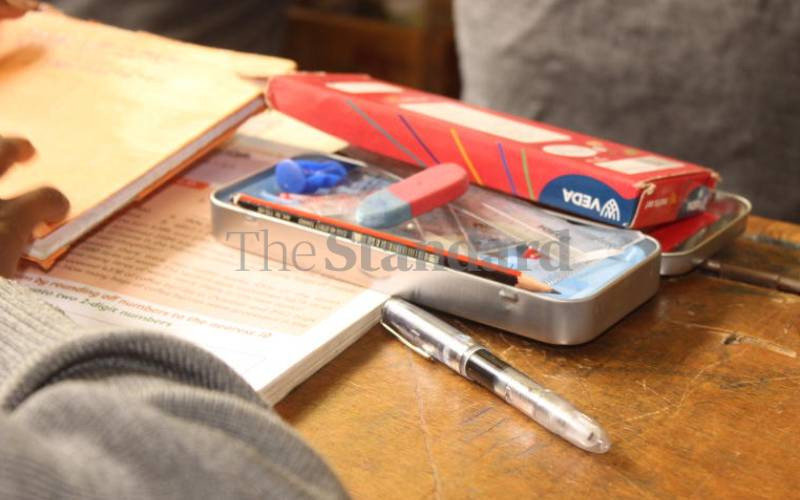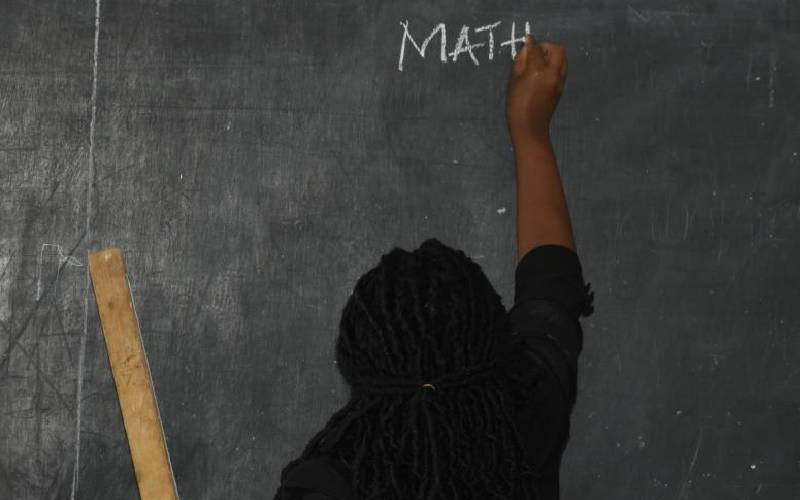 |
|
Andrew Sankale assists the students in classroom. [Photo: Jenipher Wachie/Standard] |
By BRIGID CHEMWENO
Kajiado, Kenya: Josphat Rempesa, 26, and age-mate Josphat Tupane are counting the days until next month’s Kenya Certificate of Primary Education.
Their determination to improve their lot is evident from their eager demeanour when discussions about their school, Ewangan Night School, in Olmaroroi, in Kajiado West, come up.
The pair does not mind the 10-kilometre daily trek to school—when the bell goes at 7 pm, they are always seated ready for the three-hour school session that ends at 10 pm.
The short class notwithstanding, the duo have had a crash course that has compressed what is traditionally eight years of learning to three years.
Rempesa and Tupane are the only two Ewangan Night School candidates sitting for KCPE this year, but they think they are prepared after three years of study.
“I learned a few Swahili words when I was in Bible school but I could not read nor write in English,” says Rempesa, recalling his early pursuit for knowledge.
Nevertheless, the father of three is determined to qualify for secondary school next year, but he insists schooling must be part time as he has to put food on the table, which can be quite difficult for a nomadic pastoralist like him.
Transformation
“I have to hire help to look after my goats and cows even as my wife helps with the household chores,” he says.
For Rempesa, education will key to transforming his life, and even though the quality of instruction, particularly in the earlier years, was unsuitable for adult learners, he feels quite ready to have a go at the KCPE. He smiles as he recalls his earlier struggles.
“I often carried my books with me as I herded livestock even though reading was an effort. It would take me two days to read a single page,” he chuckles.
Rempesa is not deterred by his age in a society that values masculinity and scoffs at anything associated with children . . . particularly primary school learning. Not surprisingly, he is often a butt of jokes among his cohorts — many of those who went through the circumcision rituals with him openly disparage his association with a pursuit associated with children. Nevertheless he ploughed on and feels confident that his literacy and numeracy skills are adequately developed for testing. The KCPE will be the litmus test, he feels.
The co-founder for Ewangan Night School, Kyle De Souza, is equally confident Rempesa can succeed. De Souza says Rempesa is an active student who has never failed to attend class.
Grade
Stay informed. Subscribe to our newsletter
If the adult students make the grade, they can have a realistic chance of qualifying for secondary school, and even university in later years if a sponsor can be found, says, De Souza.
Because of his language proficiency, Rempesa has been appointed chairman of the Ewangan Night School. With this recognition comes high—often unrealistic—expectations from others and this leaves Rempesa amused.
“My wife, who has never been to school, believes that I should be wealthy,” he says.
Rempesa gets by with what he owns—he solely relies on his livestock to fend for his family. To raise money for their upkeep, he often sells his goats and cows and this keeps them going, especially when the price of animals rises. When demand is high, a goat can fetch as much as Sh10,000 and an adult cow Sh40,000. But this is not enough for Rempesa who feels education will open up more opportunities.
Ewangan Night School has to struggle to keep student numbers up, says De Souza. When the school was first established in 2011, 40 students registered, but the number fluctuates as pastoralists move from place to place in search of pasture for their livestock.
“Some herders come for a few months and when they leave to look for pasture elsewhere, they vacate the place and forget about the learning,” De Souza observes.
Not all pastoralists—particularly the herders—can attend night and some are forced to suspend their studies from time to time, especially during the dry season when their employers may require them to relocate to other areas in search of pasture. But because they are used to foot travel, long treks to school is easily managed.
Besides, using mechanised transport is too expensive, says Rempesa.“Hiring a boda boda is too expensive for herders who pay Sh400 to and fro every day. Matatus cease to operate at 7 pm,” he adds.
Ewangan Night School is seeking to establish some regularity in its school programme, and boost attendance. During market day on Fridays, for example, attendance is low, says Andrew Sankale, a teacher at the school. Then there are cultural roles that interfere with the school programme. Sankale says most of his students are Maasais employed to look after goats. They enrolled for class after the school convinced their employers to release their herders to study in night school as they are too busy during the day.
As the school expands and takes in mores students, land will be purchased for the construction of more classrooms, says De Souza. The next frontier will be enrolling women, he says.
“Our primary objective is to find a high density, high impact area. We are going through the process of NGO registration so that we can offer both day and night classes since the women are also hungry to learn, but for a multitude of cultural reasons have not joined night school,” he said. The sky for them is the limit.
 The Standard Group Plc is a
multi-media organization with investments in media platforms spanning newspaper
print operations, television, radio broadcasting, digital and online services. The
Standard Group is recognized as a leading multi-media house in Kenya with a key
influence in matters of national and international interest.
The Standard Group Plc is a
multi-media organization with investments in media platforms spanning newspaper
print operations, television, radio broadcasting, digital and online services. The
Standard Group is recognized as a leading multi-media house in Kenya with a key
influence in matters of national and international interest.
 The Standard Group Plc is a
multi-media organization with investments in media platforms spanning newspaper
print operations, television, radio broadcasting, digital and online services. The
Standard Group is recognized as a leading multi-media house in Kenya with a key
influence in matters of national and international interest.
The Standard Group Plc is a
multi-media organization with investments in media platforms spanning newspaper
print operations, television, radio broadcasting, digital and online services. The
Standard Group is recognized as a leading multi-media house in Kenya with a key
influence in matters of national and international interest.









